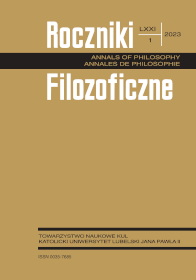NEOPATRYSTYCZNA KONCEPCJA ASCEZY SERGIEJA CHORUŻEGO (1941–2020) I JEGO HEIDEGGEROWSKO-FOUCAULTIAŃSKIE INSPIRACJE
NEOPATRISTIC THEORY OF ASCETISM ACCORDING TO SERGEY KHORUZHIY (1941–2020) AND HIS FOUCAULTIAN- HEIDEGGERIAN INSPIRATIONS
Author(s): Justyna KroczakSubject(s): Social Philosophy, Contemporary Philosophy, Existentialism
Published by: Towarzystwo Naukowe KUL & Katolicki Uniwersytet Lubelski Jana Pawła II
Keywords: Sergey Khoruzhiy; ascetics; the existential analytic of Dasein; Foucault; Technologies of the Self; energy; hesychasm;
Summary/Abstract: In the article, I present the philosophic contribution of the contemporary Russian neo-patristic thinker, Sergey Khoruzhy, with particular emphasis on his original concept of the theory of asceticism (the theory of energoforms). It is based on Patristic sources, but reveals inspirations from the findings of contemporary Western European philosophy as well, especially from the thought of Martin Heidegger and Michel Foucault. In the article, I analyze the main assumptions of Khoruzhy’s theory of asceticism and comment on the Heideggerian-Foucaultian elements contained in it. Reflections on asceticism touch on both typically philosophical problems, the ontological ones, where Heidegger’s inspirations are manifested, and on historical and hermeneutical ones, where we see a polemic with Foucault. In conclusion, I attempt a comparative analysis of Heidegger’s and energystic vision of man, probing whether the phenomena of spiritual life such as asceticism can successfully be a subject of theoretical considerations and how universal are some theological and philosophical (ontological) interpretations of the human condition.
Journal: Roczniki Filozoficzne
- Issue Year: 71/2023
- Issue No: 1
- Page Range: 311-323
- Page Count: 13
- Language: Polish

